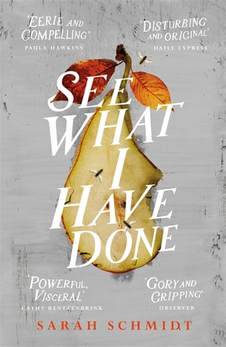See What I Have Done by Sarah Schmidt
On a scorching August morning in the last decade of the nineteenth century Andrew Borden and his wife, Abby, were brutally murdered in their Massachusetts home. Andrew’s adult daughter, Lizzie, was charged with the murder and acquitted by a jury unable to believe a woman could do such a thing. If that story sounds familiar it might be due to the skipping rhyme, Lizzie Borden took an axe, and gave her mother forty whacks … Australian Sarah Schmidt’s debut novel reimagines life in that house around the day of the murder and its aftermath.
From the first page, when Lizzie discovers her father’s bleeding body in the sitting room, the feverish sensual language draws the reader into the heat, stink and claustrophobia of a house that feels as much a prison as a home. Related from the points of view of Lizzie, her elder sister, Emma, the Irish maid, Bridget, and the hired assassin, Benjamin, who feels cheated of his chance to dispatch Andrew, the novel circles in time, hinting at methods and motivations but without serving up clear answers. Although the police arrive to investigate, See What I Have Done is less a crime novel than a portrait of entrapment in an unhappy family.
Lizzie is an embittered young woman, so petulant and childlike it’s hard to believe she is in her 30s and has spent several months on the European Grand Tour. I wondered how much her addled brain stemmed from her mother’s early death (Abby is her stepmother), a life of enforced idleness, the suffocating heat or the doctor’s recent administration of a sedative. Ten years older, Emma has escaped to a friend’s house a fortnight before the murders, due to begin an art course the very day she’s summoned home. The love, loyalty and hatred that bind the sisters is chillingly evoked, reminiscent of the enmeshed relationship in The Looking-Glass Sisters.
The language is audaciously original, but how much you enjoy it might depend on whether you can admire the sentence The clock on the mantle ticked ticked enough to bear its frequent repetition (it appears three times on one page) in Lizzie’s narrative. Although I balked at it even the first time round, I nevertheless appreciate a writer and publisher prepared to bring out something a bit different (especially after our discussion around Paris Mon Amour). Thanks to Tinder press for my review copy.
| If you’re drawn to fiction about dysfunctional families, and psychological entrapment in the context of a crime, you might also enjoy my own recently published novel, Underneath. |
Lea by Pascal Mercier
Martijn van Vliet recounts the tragedy of his daughter’s mental collapse to a stranger, Adrian Hertzog, as they travel together from Provence to Bern where they both live. Adrian, who has his own issues with distance from a daughter as well as a collapsed career, is immediately drawn into Martijn’s story while unsure whether he’ll be able to bear hearing it. The distancing effect of this narrative device (we are meeting Lea, supposedly the central character, third-hand) is insufficiently compensated for by the parallels between the men’s experience of fatherhood and Adrian is so totally sympathetic I expected some dramatic turnaround the end which, if present, I failed to notice.
First published in Germany in 2007, the English translation by Shaun Whiteside is published this month by Atlantic who provided my review copy.
For more on this topic see my post Four Fictional Absent Fathers and, for a short story on the intense relationship between musicians and their teachers, Melanie's Last Tune.
| The compilation of responses to the weekly flash fiction challenge at the Carrot Ranch is another way in which disparate stories find connection. This week’s prompt is to use sound to create a story, not particularly my strong suit, but Pascal Mercier’s novel gave me a good place to start. Did you know that musicians, while more likely to be paid for their performance than jobbing writers, rarely earn enough to own their instrument? It makes me thankful I don’t have to work on a hand-crafted typewriter! |
Million-dollar violin
The sound was sublime, more mystical than any music. But Lea wasn’t satisfied. Replacing the instrument on its stand she tucked another under her chin. Serenity swept through her father’s body as she slid the bow across the strings. But still not good enough for Lea. He cringed when she picked up the one with the million-dollar price-tag. But the tone! The resonance! The joy that entered through his ears, echoed in his head to be transported by his arteries to his toes. He’d do anything to get it for her. Even give the devil his soul.



























 RSS Feed
RSS Feed





















